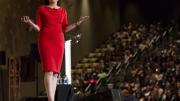In 1963, eight women crossed the Charles River to crack a barrier that had stood for more than half a century at Harvard, becoming the first of their gender to enroll in the Business School’s two-year M.B.A. program. Fifty years and 11,000 female graduates later, women make up about 40 percent of today’s incoming M.B.A. classes. An equal number of men and women graduate with honors, and their current dean, Nitin Nohria, considers himself a feminist.
Yet when Facebook chief operating officer Sheryl Sandberg ’91, M.B.A. ’95—the keynote speaker at the recent W50 Summit, a two-day conference celebrating 50 years of women in the M.B.A. program—asked a group of about 800 alumnae gathered in Burden Hall to stand if they had ever vocalized wanting to become CEO of their own companies, almost no one did.
“I’m here today to do one thing: to give every woman in this audience not just the permission, but the encouragement to stand up next time that question is asked,” said Sandberg, author of the New York Times best-selling book Lean In. “Not just to be CEO of the company you are in, but to do anything you might not think you can do…anything you might be afraid to do. I want to do that for the men in this room today as well, but I want to do it especially for the women, because the blunt truth is, men still rule the world.”
Throughout the two-day conference, alumnae gathered in small groups to discuss topics like “Negotiate What You Need to Succeed: A Workshop for Women,” “Getting onto Boards Bootcamp,” and “Using Business Acumen to Effect Social Change.” They heard from such business-world leaders as former Time Inc. chief Ann Moore, M.B.A. ’78, and Gail McGovern, the president and CEO of the American Red Cross, as well as from prominent faculty members, including Arbuckle professor of business administration Rosabeth Moss Kanter. A Women’s Place, a new film on the history of women at HBS, was screened on Thursday evening.
The W50 Summit was a time for celebration as well as thoughtful reflection, but also a moment for HBS women to ponder the future and think of ways to create a culture in which they can be truly equal to men in the workplace. As President Drew Faust noted in her opening address, women are far from reaching parity with their male peers: they comprise only 4 percent of Fortune 500 Company CEOs, run less than 10 percent of America’s venture capital firms, and hold just 26 percent of full professorships across the country and about 20 percent of top government posts.
How to define success when it comes to the education of women—whether at Harvard Business School, or in the United States, or globally—remains a pressing question, Faust noted, before offering three reasons why it should remain a crucial concern. “First, we educate women because it is fair—a level field, as we aspire to include women as full and equal participants in society,” she said.
We educate women also because it is smart: women are one half of our human resources, and we increasingly see the beneficial effects of educated women in all realms of life and in every part of the world. Finally, we educate women because it is transformative. Not only boosting incomes and economies, education elevates us, diffusing differences, opening common ground, and making the most of all of our human capacities.
Faust discussed the history of the first women to enter HBS, praising their entry into “a kind of other world that was up to that point reserved for men.” (She mentioned a 1963 Crimson article on women at HBS that stated: “perfume wafted through the corridors, and some men complained.”) The women at HBS set out to succeed, Faust said, whether it meant studying harder than their male peers, doing without on-campus housing until 1969, or petitioning for a women’s lounge in McCulloch Hall.
On the first day of the conference, Wilson professor of business administration Robin Ely, the senior associate dean for culture and community at HBS, took the podium at Burden Hall to discuss a new survey—Life and Leadership After HBS. It aims to “open a dialogue” about gender and work, to gain insight into the realities, decisions, and tradeoffs that the school’s men and women make regarding work and family life. (Of the 26,000 alumni contacted, 6,458 completed the survey; their HBS affiliations ranged from the M.B.A. and doctoral programs to executive education programs and early offerings such as the Harvard-Radcliffe Program in Business Administration.)
Answers to such questions as “What factors impede women’s advancement?” and “What do our Alumni value?” indicated that less than a tenth of Generation X and Baby Boomer women left the workforce to care for children full-time. That finding debunks the common perception that female Harvard M.B.A. graduates are staying home in order to raise children—though it doesn’t explain the dearth of women CEOs.
Ely, in presenting the survey’s findings, engaged the audience in a dialogue about those factors that impede women’s advancement to leadership roles. “There is a whole set of experiences that look less like women opting out, and more like women being pushed out, by organizations that demand a 24/7 work schedule,” she said. “Women are being pulled out by a culture that promulgates a compelling—some might say guilt-inducing—image of mothering that is hard to live up to while you are trying to hold a job.”
Ann Moore spoke on the importance of staying sane in the workplace, encouraging women to get enough sleep, exercise, empower their assistants, and do little things like taking a five-minute break: all “mind-clearing tricks to break the logjam in your life.” The former Time leader said that as Americans are starting to see signs of a financial recovery, she worries “we didn’t seem to learn much” from disasters like Hurricane Katrina or the collapse of Lehman Brothers, and is disappointed that this country has not made better progress in bridging the gender and pay gaps that exist in top leadership positions.
She asked, “Are we wiser and better prepared to deal with new challenges going forward?” Challenging her audience, she declared:
I don’t know about you, but I’m not spending my twilight years playing catch-up again. I got through HBS in the ’70s when there wasn’t even a proper ladies room in Aldrich Hall. I played basketball in the ’60s with that stupid three-dribble rule. I had to go out of state for college, because my state school, UVA, was all male. I spent my lifetime catching up—I caught up. So let’s not slip behind again.











